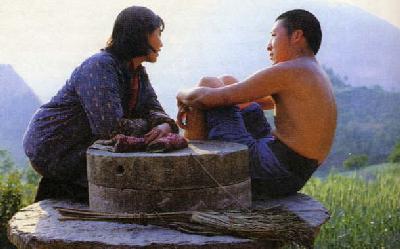In The Wild Mountain, directed by Yan Xueshu, was the most successful in depicting changes in Chinese lives after the reform that began at the end of the 1970s. The film adopts a simple and unadorned approach in its presentation of the joys and sorrows of four farmers of two families at Jiwowa Village, deep in the Qinling Mountains. Because of reforms in the rural areas, the two families are re-organized after unusual changes. The film shows in a profound way the inevitability of the reform.
 |
| A scene fromIn the Wild Mountain |
The story goes like this: Hehe, a former soldier, is trying lots of business in the village but fails every time. His wife Qiurong thinks him a failure and divorces. She later remarries another one who is a family man. The man's ex-wife Guilan is a woman with innovative ideas and trying to do silk trade. During the work she meets Hehe and falls in love with him. They cooperate with each other well. Guilan encourages Hehe to go out of the village to the outside world. After years of hard work, Hehe comes back home with wealth and a tractor, and marries Guilan.
The film met with wide acclaim and won several prizes at home and abroad, including the outstanding Film Prize issued by the State Administration of Radio, Film and Television in 1985.
